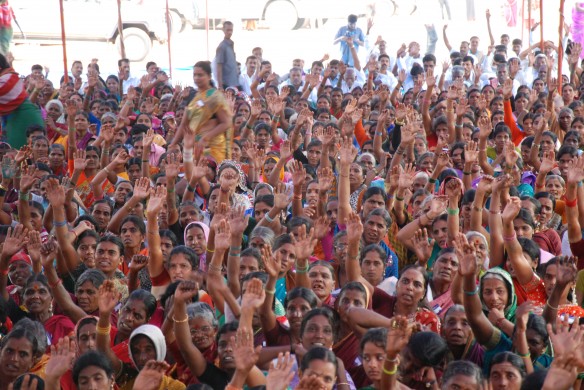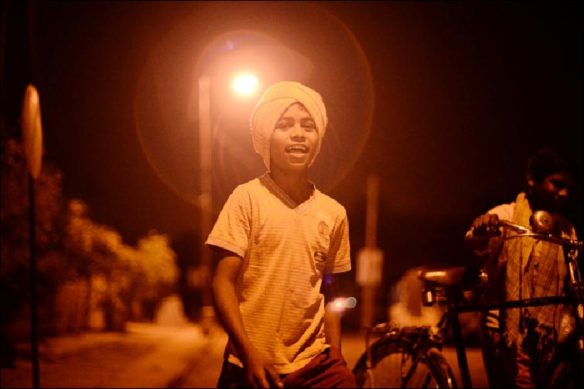Local government
In recent years, CWC has become increasingly active in campaigning for decentralisation of political power and government services in Karnataka and across India. Strong, empowered local governments are crucial to addressing the problems of child labour and poverty in all its forms, but in recent years decentralisation – mandated by the Indian constitution – has been undermined.
Decentralised government has a long history in India. Mahatma Gandhi first popularised the idea in the 1940s with his concept of Panchayati Raj – ‘village self-rule’. But it was the passage of the 73rd and 74th Constitutional Amendments in 1992 that introduced the structures of decentralised government, in both rural and urban areas, that exist today. CWC has campaigned since to strengthen decentralised government and, in recent years, to defend it from attempts to undermine its legitimacy.
Rural local governments
The 73rd Amendment established Grama Sabhas, village meetings, as the platform for rural people’s direct participation in the governance of their villages. Grama Sabhas elect and oversee Panchayats (village councils), who carry out the day-to-day running of villages. Panchayats at Taluk (sub-district) and District level carry out larger works such as road-building.
Karnataka has been at the forefront of implementing the 73rd Amendment, passing the Karnataka Panchayat Raj Act to establish the institutions of Panchayati Raj in 1993. Read a brief history of Panchayat Raj in Karnataka.
Grama Sabhas and Panchayats have become central institutions in CWC’s work against child labour and for the empowerment of children. Panchayats can be the most effective body through which to identify families in need of support or organise children to take action for their own rights. Through our Toofan Programme, we have introduced Makkala Grama Sabhas (children’s village meetings) and Makkala Panchayats (children’s village councils) to over 60 Panchayats across Karnataka. The establishment of Makkala Grama Sabhas and Makkala Panchayats has, in many cases, helped strengthen their ‘adult equivalents’. Read more about our work with children and governance.
But in recent years the Panchayat Raj system has come under attack. In 2007, the State Legislature passed the Karnataka Panchayat Raj (Amendment) Bill. The bill removed from Grama Sabhas and Grama Panchayats the role of identifying beneficiaries for government programmes, passing this right onto “any Committee or authority of the Government constituted in this behalf”.
CWC played a central role in resisting this undemocratic move. In May 2007, members of Panchayats from all over Karnataka formed the Grama Panchayat Hakkottaya Andolana, a state-wide movement to defend and strengthen local democracy. CWC serves as the convener and secretariat to the organisation. The Andolana organised demonstrations across Karnataka to protest the bill. Ultimately, the bill was vetoed by the Governor of Karnataka.
Since then, the Andolana has continued to work to defend and strengthen local democracy, recently mobilising more than 8000 people in Bangalore to demand financial devolution to Panchayats. Read more about Grama Panchayat Hakkottaya Andolana.
Urban local bodies
The 74th amendment, governing decentralisation in urban areas, was less ambitious than the 73rd, leaving final authority over most decisions in the hands of unelected representatives rather than directly with the people. Nonetheless, CWC has worked consistently to defending and strengthening urban decentralised government. Our work is currently focused on Bangalore city, a ‘municipal corporation’ under the law.
Bangalore was only created as a municipal corporation, the Bruhat Bangalore Mahanagara Palike, in 2007. As the second fastest growing metropolitan region in India, the competing pressures on Bangalore’s resources are many. Economic growth and infrastructure development are proceeding alongside informality of labour and deepening inequalities in the city. In such a context, the structures for planning and governance assume critical importance. CWC has been engaging with the BBMP election process, and with other city-wide processes for strengthening the implementation of the 74th constitutional amendment.
In collaboration with other citizen’s groups in Bangalore, CWC organised a workshop on ‘People’s Perspectives on Urban Governance and Planning’ in September 2009 in the lead-up to the first BBMP elections held in March 2010.
Once the new BBMP Council was in place, CWC worked closely with other groups to ensure the vibrancy of the democratic process. For instance, in late 2010, CWC produced a detailed critique of the Karnataka Municipal Corporations (Amendment) Bill, which purported to introduce new forms of community participation in urban areas of Karnataka (including Bangalore) but which, in fact, served to undermine democratic participation in governance.
We continue to monitor the situation in Bangalore and will act to defend decentralisation against any future threats.



